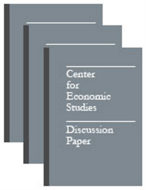Competition, Firm Innovation, and Growth under Imperfect Technology Spillovers
Competition, Firm Innovation, and Growth under Imperfect Technology Spillovers
Abstract
We study how friction in learning others’ technology, termed “imperfect technology spillovers,” incentivizes firms to use different types of innovation and impacts the implications of competition through changes in innovation composition. We build an endogenous growth model in which multi-product firms enhance their products via internal innovation and enter new product markets through external innovation. When learning others’ technology takes time due to this friction, increased competitive pressure leads firms with technological advantages to intensify internal innovation to protect their markets, thereby reducing others’ external innovation. Using the U.S. administrative firm-level data, we provide regression results supporting the model predictions. Our findings highlight the importance of strategic firm innovation choices and changes in their composition in shaping the aggregate implications of competition.
Others in Series
Working Paper
Working Paper
Working Paper




